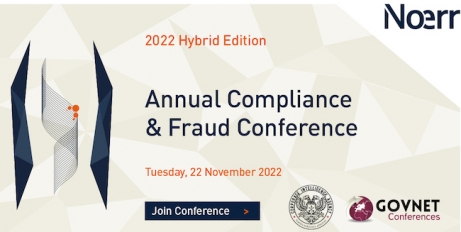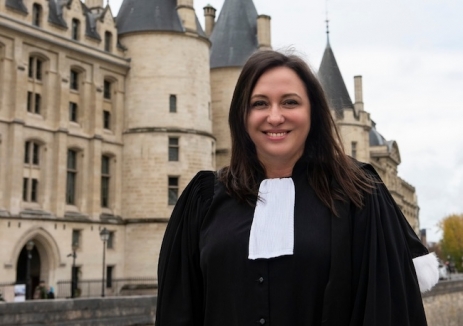
The global context, marked in recent years by challenges and turbulences such as the pandemic, the economic and energy crisis or high inflation, has made corporate fraud one of the biggest problems facing companies all over the world.
"This situation led to the need to manage corporate fraud in a more correct way, in order to obtain indisputable advantages on the market, conferred by an ethical business conduct, as well as in order to prevent the risks and losses associated with corporate fraud ", said Alexandru Ene-Drăgan, partner and coordinator of the litigation & compliance practice at the Noerr law firm at the third edition of the Annual Compliance and Fraud Conference, organized by Noerr in partnership with the Corporate Intelligence Agency (CIA).
The experts present at the conference discussed the most important topics related to fraud, such as new fraud schemes that have emerged after the pandemic, ingenious ways in which companies have been defrauded in the last year, ESG fraud, cyber attacks and fraud in public procurement. The representatives of the participating authorities addressed issues regarding the ways in which public authorities can support victims of occupational fraud, but also the ways in which fraud prevention strategies should change in the light of the new whistleblowing law.
"Very little has been said about the connection between whistleblowing and the phenomenon of occupational fraud until now, despite the fact that the protection of integrity whistleblowers has been regulated precisely to increase the degree of fraud prevention and detection in certain areas. In this sense, whistleblowing means above all an effective tool for detecting internal fraud, it is estimated that 43% - 46% of all fraud cases are discovered through integrity reports", said Oana Piticaș, coordinator of the White Collar practice Crimes within Noerr.
"It is undeniable that most fraud is discovered through whistleblowing reports, but there is a very large number of reports that are made with malicious intent, for the purpose of blackmail or harassment. When such situations arise, a company's reputation suffers substantially, even if the reporting is proven in court to be malicious, a matter that is very difficult to prove anyway. Since the main problem is related to the fact that in the current legislation companies do not benefit from a good degree of protection against false warnings, it is extremely important to collaborate with experienced specialists in the field, not only as a response in such contexts, but also in the prevention stage of possible frauds, precisely in order not to end up in such extreme situations", added Gabriel Zgunea, CEO of the Corporate Intelligence Agency.
Alexandra Pădurariu, legal director of Samsung Electronics, present at this edition of the conference to present the perspective of private sector companies, pointed out: "Compliance is not a momentary effort, but requires a systematic approach. At Samsung, we have invested heavily in high-performance compliance systems and detailed employee training. We inform them both of their rights and of the obligations they assume when they decide to make such a notification; moreover, we test whether they have correctly acquired the information through customized post-training tests."
George Balaiti, Director, Control Directorate, within the National Authority for the Supervision of Personal Data Processing, emphasized the importance of conducting training among employees: "The organization is only as strong as its weakest link, so we always must be taken into account by employees. Human resource, in the absence of training, regardless of compliance systems, can end up causing immense damage."
"In the instrumentation of frauds, it is essential to have the best and most efficient dialogue between the private sector and prosecutors, which is substantially based on the intelligence product, prior to the development of a criminal case", said Marius Voineag, Deputy Chief Prosecutor, Criminal Investigation Section and criminology from the Prosecutor's Office attached to the High Court of Cassation and Justice, at the same time affirming that "with the entry into force of the new criminal code, the judicial bodies were more and more courageous in formulating accusations in criminal matters and against persons legal. At the moment we have an impressive volume of files in the works, about 1,755,000 criminal files (a large part being from the economic and financial area), and 62,917 natural persons were sent to court last year, which shows an involvement and openness without precedent from the authorities for investigating corporate fraud". "However, we also need better cooperation and openness from the private sector, a constant and constructive dialogue in this regard being very important", added Marius Voineag.
"The way in which fraud is approached, from prevention, due diligence and to investigations, is the key to an optimal and effective management of each case. We aim to contribute to the most constructive dialogue between the authorities and the private sector, both by the fact that we combine legal, fiscal and financial competences with those of intelligence, and due to the constant concern to support the judicial bodies through the in-depth, serious documentation of each file" , said Alexandru Ene-Drăgan.
Raluca Botea, coordinator of Noerr's public law practice, also spoke about a new type of fraud: "Fraud in public procurement procedures by altering the technical offer in such a way as to apparently meet the requirements of the specification is a phenomenon that increasingly reported by companies participating in these procedures. Legal remedies exist, but in order for them to be exploited, a good substantiation of the case that is brought before the authorities is necessary. The ways of obtaining evidence are increasingly complex and time-consuming, in many cases requiring international coverage and a well-established network of experts and partners. In the absence of solid evidence, legal remedies will not be available, and some companies will continue the deceptive practices and even strengthen their market position."
Another hot topic was that related to ESG fraud. ESG requirements have generated, according to Oana Piticaș, a very high opportunity for fraud, regardless of whether or not there is a non-financial reporting obligation for companies. “Where the interest is very high, the opportunity for fraud is even greater – recent investigations completed or opened especially in the US against companies that used false data on ESG checks are well known. Moreover, as far as investment funds are concerned, the ESG ratings used are not standardized or transparent, which we see for example in the case of Tesla, recently excluded from the S&P index, an index where oil and gas companies are mentioned .”
"In addition to preventing and eliminating risks, the main purpose of investigating and detecting ESG fraud must also be to guarantee compliance with ESG principles and ethics to the greatest extent possible, because only in this way can companies benefit from the major advantage that complying with ESG rules confers it in front of investors and in front of final consumers", added Alexandru Ene-Drăgan.
"Therefore, prevention and due diligence are the two key elements that must be considered every time we talk about ESG fraud. Without proper and in-depth due diligence, companies expose themselves to a huge risk: ESG fraud is a fraud to everyone, investors and end customers alike", added Dan Rusu, senior partner of the Corporate Intelligence Agency. An important role in this due diligence is cyber security, which has become a legal obligation, a compliance requirement. "Cyber security must become a natural component of our daily behavior and there is a need for interdisciplinary teams that combine technical and legal skills to face the challenges in this area", Alexandru Dan, Coordinator of Noerr's digital business practice, also pointed out .



 December 07, 2022 16:28
December 07, 2022 16:28 










